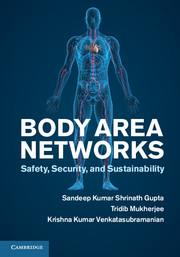Book contents
Appendix: Publication venues, academic research groups, and funding agencies
Published online by Cambridge University Press: 05 April 2013
Summary
Body area networks (BANs) are increasingly becoming a topic of great interest for researchers. Researchers are involved in the development of cutting-edge hardware for BANs, and of their software infrastructure, using BANs in medical, sports, and entertainment applications, and building theoretical background for BAN design and verification. For the dissemination of this precious knowledge several prestigious journals and conferences have come into being. Pre-eminent among them are ACM Wireless Health (http://www.wirelesshealth2012.org/) and IEEE BSN (http://www.bsn2012.org/). There are many other conferences and journals that publish research articles on BSNs. Here is a list of a few of them: IEEE Milcom (http://www.milcom.org/), IEEE Infocom (http://www.ieee-infocom.org/), Percom (http://www.percom.org/), IEEE EMBC (http://embc2012.embs.org/), and ACM MSWiM (http://mswimconf.com/2012/) are important conferences; while ACM TECS (http://acmtecs.acm.org/), ACM TOSN (https://sites.google.com/site/acmtosn/), IEEE TON (http://www.ton.seas.upenn.edu/), IEEE Proceedings (http://ieeexplore.ieee.org/xpl/RecentIssue.jsp?punumber=5), and IEEE TITB (http://bme.ee.cuhk.edu.hk/TITB/) are notable journals.
There are many academic research groups that are working on various hardware and software aspects of BANs. Specifically, the following academic research groups are involved in research related to BAN software: the IMPACT Lab at Arizona State University (http://bme.ee.cuhk.edu.hk/TITB/), the Media Labs at MIT (http://www.media.mit.edu/), the Center for Wireless Health at the University of Virginia (http://wirelesshealth.virginia.edu/), the ESSP Lab at the University of Texas, Dallas (http://wirelesshealth.virginia.edu/), the Wireless Life Sciences Alliances at the University of California, Los Angeles (http://www.wirelesslifesciences.org/), Imperial College London (http://www3.imperial.ac.uk/), the NSL at the University of Washington, the Harvard Sensor Networks Lab, and the UAV Center for Wireless Health (http:/wirelesshealth.virginia.edu/).
- Type
- Chapter
- Information
- Body Area NetworksSafety, Security, and Sustainability, pp. 127Publisher: Cambridge University PressPrint publication year: 2013



